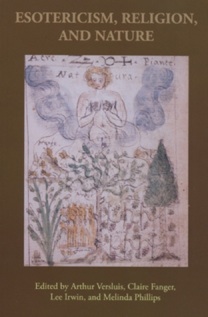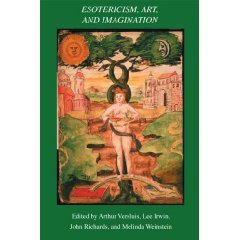| To our readers:
We are pleased to announce the publication of our second collection of articles, Esotericism, Religion, and Nature (2010).
In this groundbreaking collection, leading scholars in this emerging field explore how nature can be understood in a wide range of esoteric religious contexts. Included here are articles on subjects ranging from alchemy and panpsychism to music, Appalachian folk magic, and new religions. Esotericism, Religion, and Nature illuminates the way that nature is understood by major esoteric figures and traditions. Taken together, these articles shed new light on the connections between humanity, nature, and religion. Authors include Joscelyn Godwin, Wouter Hanegraaff, Lee Irwin, Richard Smoley, Arthur Versluis, M. E. Warlick, and many others. The second in a series of volumes on Western esotericism, this book emerged from international academic conferences held by the Association for the Study of Esotericism.
Esotericism, Religion, and Nature is widely available for purchase online, for instance, here, and here.

The first book in the series, Studies in Esotericism, Esotericism, Art, and Imagination, is widely available commercially, for instance, here, here, and here.

Esoterica’s last issue, Volume IX, is now available in pdf format from the link on our “Contents” page. Please also consider donating to the journal, as we now have a dedicated 501(c)3 non-profit, tax-deductible account at MSU Foundation, and all funds donated to that account will also go toward the furthering of the journal and related work. Simply click on this link if you wish to further support this journal and our work here.
Our ninth volume features Allison P. Coudert on “Angel in the House or Idol of Perversity?: Women in Nineteenth-century Esotericism,” Hereward Tilton on “Of Ether and Colloidal Gold: The Making of a Philosophers’ Stone,” Ariel Hessayon on “‘The Teutonicks Writings’: Translating Jacob Boehme into English and Welsh,” Gustav Adolph Schoener on “‘The Flood’ of 1524: The First Mass-media Event in European History,” as well as reviews of books, including Robert Lima, Stages of Evil: Occultism in Western Theater and Drama, Sophia Heller, The Absence of Myth, Hugh B. Urban, Magia Sexualis: Sex, Magic, and Liberation in Modern Western Esotericism, and Marsha Keith Schuchard, Why Mrs Blake Cried: William Blake and the Sexual Basis of Spiritual Vision.
Our eighth volume includes ground-breaking articles, among them John Richards’s “Folk Magic and Protestant Christianity in Appalachia,” Melinda Weinstein’s “The Dionysian Body: Esotericism in the Philosophy of Norman O. Brown” (the first major article devoted to Brown’s influential work), Eric G. Wilson’s “Hermetic Melancholia and the Suffering of Androids,” Frank Klassen’s “Magical Dream Provocation in the Later Middle Ages,” as well as Claire Fanger on G. Hedegârd, ed., Liber Iuratus Honorii: A Critical Edition of the Latin Version of the Sworn Book of Honorius, and Arthur Versluis on Mark Sedgwick, Against the Modern World: Traditionalism and the Secret Intellectual History of the Twentieth Century. This will be one of our richest issues ever.
Our seventh volume features several articles with political implications, including Hugh Urban on religion, secrecy, and the Bush II administration, an article on Carl Schmitt and anti-esotericism, an extensive article by Robert Collis on alchemy in Russia, and various new book announcements and book reviews. All our articles, reviews, and exhibitions can be found by clicking on “Contents”
Our sixth volume features National Humanities Scholar Eric G. Wilson entitled "Emerson's Gnostic Democracy," as well as an article on the visionary mystic Jane Lead by British scholar Julie Hirst, and, in a new initiative, a short work of visionary fiction by renowned Australian novelist James Cowan.
As regards previous issues: our fifth volume includes an exceptional set of articles, including musicologist David Stowe's article on the esotericism of the American musician Sun Ra; a strikingly illustrated article by Patrizia Granziera on Freemasonry and garden architecture; the second in a two-part series of articles on method in the study of esotericism by Arthur Versluis, and other groundbreaking articles as well.
Our fourth volume featured a wide range of articles, including, from our series Studies in American Esotericism, "Powwowing: A Persistent American Esoteric Tradition," by David Kriebel, as well as "Astrology: Between Religion and the Empirical" by Gustav-Adolph Schoener, "Within This Darkness: Incarnation, Theophany, and the Primordial Revelation," by Tom Cheetham and "What is Esoteric? Methods in the Study of Western Esotericism," by Arthur Versluis.
Earlier issues included two new full-length studies on a global theme: Lee Irwin's "Western Esotericism, Eastern Spirituality, and the Global Future," and Harry Oldmeadow's "The Western Quest for 'Secret Tibet.'" These articles, taken together, constitute what is perhaps the first full-length look at how Western esotericism has been influenced by the influx of Asian religious traditions, particularly in the twentieth century. Also featured in an earlier issue is the first translation from Latin of John of Morigny's Liber Visionum edited, translated, and introduced by Claire Fanger and Nicholas Watson. Readers are strongly encouraged to read Hugh Urban's remarkable article on "The Omnipotent Oom: Tantra and Its Impact on Modern Western Esotericism." And we included another painting exhibition with commentary, this one by contemporary painter John Eberly.
Still earlier issues include other major articles: an exceptional examination of Renaissance magic by Wouter Hanegraaff entitled "Sympathy or the Devil," and a groundbreaking article by Marsha Keith Schuchard entitled "Why Mrs. Blake Cried: Swedenborg, Blake, and the Sexual Basis of Spiritual Vision." We also featured the online audio premiere of composer Paul Wesley Hofreiter's "Mystical Sonata #19," with the composer's commentary, and a painting exhibition with commentary of the work of contemporary painter Don Karr.
Background Information:
The word "esoteric" traditionally refers to spiritual, initiatory, or inner knowledge. Our primary emphasis is the scholarly investigation of esoteric spiritual traditions, with a special emphasis on Western esotericism. Western esoteric traditions are of a remarkable variety, ranging from Gnosticism and Hermeticism to alchemy, magic, Christian mysticism, Kabbalah, Rosicrucianism, Freemasonry, and other secret or semi-secret societies. Investigation in this field is by nature transdisciplinary, drawing upon such diverse disciplines as history, religious studies, and literature, without belonging solely to any of these.
Esoterica does not endorse any particular methodological approach to the study of esoteric traditions, but does discourage reductionism - that is, the denigration rather than the study of esoteric traditions or figures. The scholarly study of esotericism as a field is still relatively new, and we encourage a variety of approaches to this rich field of inquiry as well as open discussion of methodological differences, while bearing in mind our common aim of broadening and deepening our understanding of the vast range of esoteric works and figures.
This is an academic, peer-reviewed journal, and our goals are to act as a means for communication among existing scholars in the field, to be a resource for those in academia encountering this field for the first time and considering introducing their students to it, to encourage new scholars in this emerging discipline, and to offer a reliable source of knowledge to all who are interested in esoteric studies.
More than most, this field of inquiry lends itself to electronic media because it is so replete with illustrations, music, and often enigmatic writings. We are not simply placing written materials online, but seeking to offer a new form of scholarship that takes advantage of technology to present a fuller understanding of the ambience of any given work or figure. In this way, our journal will be of benefit not only to researchers in this field, but also to those who wish to draw upon our resources in order to study and teach this field in university and college classrooms.
We also invite you to visit
www.aseweb.org, the website of the Association for the Study of Esotericism [ASE], which will feature news about the ASE’s most recent conference at Charleston, South Carolina in 2008. There are some excellent articles awaiting publication, so do return to Esoterica to check for occasional updates.
|